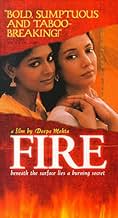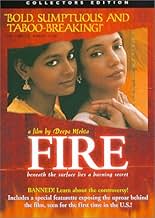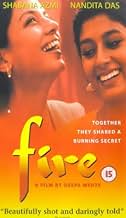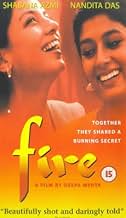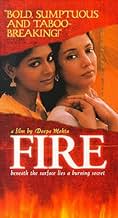CALIFICACIÓN DE IMDb
7.1/10
6.6 k
TU CALIFICACIÓN
Dos mujeres abandonadas por sus maridos encuentran amor y consuelo la una en la otra.Dos mujeres abandonadas por sus maridos encuentran amor y consuelo la una en la otra.Dos mujeres abandonadas por sus maridos encuentran amor y consuelo la una en la otra.
- Dirección
- Guionista
- Elenco
- Premios
- 7 premios ganados y 1 nominación en total
Jaaved Jaaferi
- Jatin
- (as Javed Jaffrey)
Devyani Saltzman
- Girl in video shop
- (as Devyani Mehta Saltzman)
- Dirección
- Guionista
- Todo el elenco y el equipo
- Producción, taquilla y más en IMDbPro
Opiniones destacadas
For a moment, let's put aside the cultural aspects of this movie, even if it is a very important side of it, and let's look at the simple fact that this is a very nice love story. Two individuals find themselves in a difficult situation, caused by two selfish husbands. They have to live through their sad days without any ray of hope. If each one of these two women had been alone, imagine what kind of life each one would have had to accept. They found each other and they fell in love. That this love was against all the social, religious and cultural laws of their environment is almost irrelevant. They loved each other, found relief in each other, that was sufficient. The reaction of the individuals around them is but a small fact that they have to accept, suffer even, and then they can go on with their lives, their life. Very nice.
I was so pleased to discover this movie. The box here in America makes it sound like it is soft core porn with descriptions such as "erotic heat" and the like.
But I was moved by the relationship of these two women and how it reflected their place in society. I was so impressed by how Shabana Azmi (Radha) showed her character growing as she began to understand what she really needed in her life.
Also, early in the film I began to worry that maybe it would just be a movie about how younger women influence traditional families by bringing in new ideas, but the first time Radha and Sita make love, Sita (Nandita Das) seems innocent and unsure about what has happened (even though she initiates it.) I realize that as a character she is going through her own development that starts with a woman who is unsure of expressing her opinion to one who can give voice to what she thinks.
Also, how the family is portrayed seems real in that people do not just immediately change when presented with new ideas. What I mean is that in American movies, we have the tendency to have all the main characters "work things out" by the end of the movie. So when Radha's husband finds Radha and Sita together he doesn't just say he was wrong to ignore Radha and make it up to her. He struggles and falls just like real people do.
This was great work. Radha and Sita have a true romance and the world they occupy is believable and impressive.
P.S. Also a reviewer before me described several parts of the movie and said negative things about it, but couldn't have been watching it too closely since the reviewer confuses the names of all the principle characters. It is Radha that catches on fire not Sita, and Radha who is the elder wife.
Also, I disagree with the characterization that the movie portrays men as the bad guys. I feel it shows very human people. Even the eldest female character Biji turns a blind eye to the pain and feelings of her caregiver Radha. People (men and women) are not perfect and the mistakes made by Radha and Sita's husbands are real things that men actually do and think their wives should just go along with because they are the wives. Does that make them bad men? No. But it does make it a bad system, which I believe is the real foe in this film.
But I was moved by the relationship of these two women and how it reflected their place in society. I was so impressed by how Shabana Azmi (Radha) showed her character growing as she began to understand what she really needed in her life.
Also, early in the film I began to worry that maybe it would just be a movie about how younger women influence traditional families by bringing in new ideas, but the first time Radha and Sita make love, Sita (Nandita Das) seems innocent and unsure about what has happened (even though she initiates it.) I realize that as a character she is going through her own development that starts with a woman who is unsure of expressing her opinion to one who can give voice to what she thinks.
Also, how the family is portrayed seems real in that people do not just immediately change when presented with new ideas. What I mean is that in American movies, we have the tendency to have all the main characters "work things out" by the end of the movie. So when Radha's husband finds Radha and Sita together he doesn't just say he was wrong to ignore Radha and make it up to her. He struggles and falls just like real people do.
This was great work. Radha and Sita have a true romance and the world they occupy is believable and impressive.
P.S. Also a reviewer before me described several parts of the movie and said negative things about it, but couldn't have been watching it too closely since the reviewer confuses the names of all the principle characters. It is Radha that catches on fire not Sita, and Radha who is the elder wife.
Also, I disagree with the characterization that the movie portrays men as the bad guys. I feel it shows very human people. Even the eldest female character Biji turns a blind eye to the pain and feelings of her caregiver Radha. People (men and women) are not perfect and the mistakes made by Radha and Sita's husbands are real things that men actually do and think their wives should just go along with because they are the wives. Does that make them bad men? No. But it does make it a bad system, which I believe is the real foe in this film.
A fairly interesting look at some characters from India's burgeoning middle class. Although India is rapidly modernizing, her culture is not keeping up. This film involves the patriarchal society, where women are not yet truly free citizens. A land of arranged marriages, men who dally with mistresses with total impunity, and women who are expected to tolerate all this, will eventually come up short. I was impressed with Nandita Das, who was quite attractive, and played her character with total earnestness. But I was even more impressed with Shabana Azmi, who I understand is a long-time fixture of Bollywood. Her quiet beauty and low-key psychic suffering was excellent. The lesbian subtext of this film was never particularly erotic, and never titillating. (Darn!) Worth a look for those interested in vastly different cultures.
In the contemporary India, Jatin (Jaaved Jaaferi) is a man in love with the Chinese Julie (Alice Poon), who does not want to get married and become a housewife, since she intends to move to Hong Kong and become an actress. Due to the pressure of his family asking for a baby, Jatin decides to get married with the virgin Sita (Nandita Das) in a arranged marriage. Sita moves to the house of Jatin's family, where live on the second floor the matriarch Biji (Kushal Rekhi), the servant Mundu (Ranjit Chowdhry) and the unfertile Radha (Shabana Azmi) and her husband Ashok (Kulbhushan Kharbanda). On the first floor, they run a small business of video rental and food. Ashok opted for the celibate, since in his opinion, sex would be only for procreation and never for lust or desire. Both women are neglected by their husbands, and their loneliness turns into a lesbian relationship. I do not know much about Indian society, but I found this movie a sensitive and delicate love story of two needy women, born and raised in a repressive and male society. The story is never vulgar or erotic, and it is very easy to understand their attraction. The beauty of Nandita Das is very impressive. The direction and the performance of the cast is outstanding. Another excellent example of the Indian cinema. My vote is eight.
Title (Brazil): 'Fogo e Desejo' ('Fire and Desire')
Title (Brazil): 'Fogo e Desejo' ('Fire and Desire')
Bold, controversial and taboo-breaking are among the many attention-grabbing words that have been used to describe 'Fire' and this has no doubt helped the film gain recognition. However, I feel that such adjectives undermine the true beauty of that is depicted in this picture. It deals with many themes such as feminism, affection, love and freedom and at the heart of the film lies the relationship between Seeta and Radha. The bond between them is portrayed with such innocence, tenderness, affection and sensibility that its beauty stands out. The growth in the two characters and the development of their relationship is splendid to watch. While the relationship is portrayed with sensuality, there is no titillation or overt skin exposure.
Due to the theme of homosexuality and the questioning of religion, 'Fire' was ridiculously banned in several countries. It is never specified whether Seeta or Radha were exclusively homosexual. They're never shown to not enjoy a sexual relationship with their respective male partners. Radha has made numerous attempts over the years to have that kind of intimacy with her celibate husband but he's the one who refuses while in Seeta's case, sex is a mechanical thing for her husband. What they Seeta and Radha find in each other is affection, love, desire and tenderness, something they yearned for but never had with their husbands.
Many have argued that Deepa Mehta deliberately uses shock value and portrays India as repressed in order to make her film appeal to the Western audience. I don't know whether that was her intention with 'Fire' but to me it felt like an honest movie and the problems portrayed in this film are still very much a reality in India. I would even go as far to say that this is among Mehta's best works. Her use of metaphors is brave and gives the film a poetic feel.
Mehta's films have often scored high in the technical department and 'Fire' is no different. Here the cinematography and A.R. Rahman's score particularly stand out. The music is mesmerizing. The art direction too is brilliant.
Luminous Nandita Das is terrific as the young, vivacious and energetic Seeta. Shabana Azmi is once again transcendent. Her nuanced, quiet and restrained performance easily touch on the heartstrings. Kulbhushan Kharbanda and Javed Jaffrey provide good support.
Forget all the labelling, controversial or not 'Fire' is worth seeing for the beauty it portrays when two people find love and freedom in each other.
Due to the theme of homosexuality and the questioning of religion, 'Fire' was ridiculously banned in several countries. It is never specified whether Seeta or Radha were exclusively homosexual. They're never shown to not enjoy a sexual relationship with their respective male partners. Radha has made numerous attempts over the years to have that kind of intimacy with her celibate husband but he's the one who refuses while in Seeta's case, sex is a mechanical thing for her husband. What they Seeta and Radha find in each other is affection, love, desire and tenderness, something they yearned for but never had with their husbands.
Many have argued that Deepa Mehta deliberately uses shock value and portrays India as repressed in order to make her film appeal to the Western audience. I don't know whether that was her intention with 'Fire' but to me it felt like an honest movie and the problems portrayed in this film are still very much a reality in India. I would even go as far to say that this is among Mehta's best works. Her use of metaphors is brave and gives the film a poetic feel.
Mehta's films have often scored high in the technical department and 'Fire' is no different. Here the cinematography and A.R. Rahman's score particularly stand out. The music is mesmerizing. The art direction too is brilliant.
Luminous Nandita Das is terrific as the young, vivacious and energetic Seeta. Shabana Azmi is once again transcendent. Her nuanced, quiet and restrained performance easily touch on the heartstrings. Kulbhushan Kharbanda and Javed Jaffrey provide good support.
Forget all the labelling, controversial or not 'Fire' is worth seeing for the beauty it portrays when two people find love and freedom in each other.
¿Sabías que…?
- TriviaDeepa Mehta after being inspired by Nandita Das in the film.She signed her for Earth 1947.(1999).
- ConexionesFeatured in The Movie Show: Episode dated 13 August 1997 (1997)
- Bandas sonorasBombay Theme
(1995)
Composed by A.R. Rahman
From the Bombay (1995) soundtrack
Available on CD & cassette from PolyGram India Ltd.
Courtesy of Mani Ratnam
Selecciones populares
Inicia sesión para calificar y agrega a la lista de videos para obtener recomendaciones personalizadas
- How long is Fire?Con tecnología de Alexa
Detalles
Taquilla
- Total en EE. UU. y Canadá
- USD 402,749
- Fin de semana de estreno en EE. UU. y Canadá
- USD 14,384
- 24 ago 1997
- Tiempo de ejecución1 hora 48 minutos
- Color
- Mezcla de sonido
Contribuir a esta página
Sugiere una edición o agrega el contenido que falta





